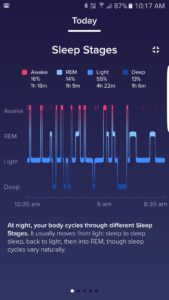If you are getting the recommended amount of sleep 7-9 hours a night, you are spending One-third of a day – Sleeping.
Ever wonder how sleep helps us restore our productivity and physical energy?
You might feel like sleeping is considered ” lazy,” but your mind and body are busy during your sleep.
We will sleep through these stages of sleep every night.
Each stage of sleep will have a different response for your body.
So the question is, “How much Light, Deep, REM sleep is considered Healthy?”
Light Sleep
Light sleep is a non-REM stage, and it’s easiest to wake up during this stage.
On average, you will spend about 50 – 60% of your night in this stage.
Light sleep is a crucial stage when your body processes memories and emotions, and your metabolism regulates itself.
Your breathing and heart rate will slow down, and getting ready to transit into the next stage of sleep.
Deep Sleep (Delta Sleep)
In this stage, your body becomes unresponsive to the surrounding.
It is a time when your body has a complete disengagement with the external.
This stage is crucial for our physical recovery.
Our brain wave will slow down to a point where it is almost offline, our muscles are completely relaxed.
Your organs detoxicate, your kidneys clean your blood, and your body replaces cells, heals wounds, and builds muscle tissues as well.
In healthy adults, about 13% – 23% of sleep is deep sleep.
So it’s roughly 60 – 110 minutes out of your 8 hours sleep.
Some people, however, find they need more Deep sleep to feel well-rested.
There is no such thing as “too much deep sleep.”
REM Sleep
If Deep sleep is all about the body, then REM sleep is about our brain.
In this stage, the brain is very active during REM sleep, yet the body is inactive. It’s so inactive; you’re actively paralyzed during REM sleep.
REM Sleep takes about 20 – 25% of your night for healthy adults, and it mostly takes place in the second half of your night.
REM sleep also has a direct effect on your brain activity and sometimes emotions.
Not having enough REM sleep will affect your ability to focus, memory problems, and you might also feel groggy.
Constantly having too much REM sleep will cause too much brain activity. It might lead to frustrations, irritability, depression, and anxiety symptoms.
Many medications will also impact our REM sleep; especially a lot of antidepressant medication will cut our REM by half!
My Stat
If you are curious, I am currently on a journey tracking my sleep log.
I am fascinated by this product. (Charge 3 by Fitbit)
Below it’s my first night sleeping on a mattress that is a bit firmer than my liking.

I will be tracking my sleep for a week to see how I perform against the “healthy” standard.
If you are curious about how I go, stay tuned, Like, and Follow our Facebook page below.
Until next time!
R&B Bedding, Bed Shop in Adelaide



